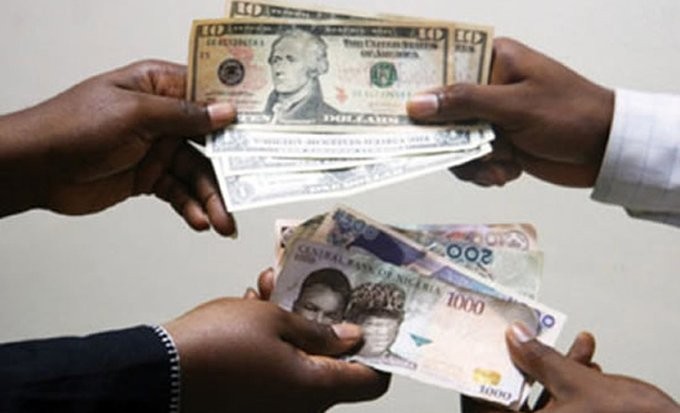Naira’s true value

The value of a country’s currency should, irrespective of whether it is operated on a fixed, floating or managed-float currency regime, depict the performance of the country’s economy and how long the country can maintain the exchange rate system.
The Central Bank of Nigeria (CBN) has adjusted the value of the Naira by as much as 15%, as it seeks a single exchange rate instead of the often criticized multiple exchange rate system exchanging at N380 to the dollar
The multiple exchange rates system, which had been criticized by the IMF, has kept the official rate at about N307 per dollar.
It uses this to supply cheap foreign exchange to government institutions and selected companies, including refined fuel importers.
The CBN now wants to merge the official rate, the rate for importers, exporters and foreign-exchange bureaus.

The strengthened concerns over a potential technical recession in Nigeria have forced the Central Bank of Nigeria to relinquish its stealth peg to truly allow the Naira to be determined by the natural forces of supply and demand.
This development simply added to the repeatedly depressed oil prices and declining oil production from weakened global economic outlook growth which noticeably soured sentiments towards the Nigerian economy.
The Coronavirus pandemic has hit China, Iran, Western Europe and the U.S. the hardest but falling oil prices and global economic stress has led to capital flowing out of emerging markets like Nigeria, in a flight to safety.
Nigeria’s currency peg is one of the most unsustainable. Foreign exchange has fallen by 20% since last June 2019 to $35.98 billion as of 21st March 2020.
In a recent chat with Nairametrics, Temitope Busari, CFA, said, “The bells of devaluation rang yet again and it really just marks the onslaught of a vicious cycle, the very same playbook in which decreasing external reserves, high debt levels and huge funding deficits, force the country into an action that essentially makes the people poorer.
“Until the underlying issues are addressed, I believe the intrinsic value of the Naira cannot be placed. I read recently that an offshore investment bank valued the Naira somewhere around $/600 and I simply chuckled at the irony of it all; they will continue to throw such sentiments around to pave the path that allows them continually pick up Nigerian assets for cheap.
“The regimented approach to our FX markets does very little to help as with simple economics, allowing the currency to float along with the forces of demand and supply will allow it settle for what it’s truly worth.”
According to her, in as much as Nigeria continues to falter with the diversification of the economy away from oil, the nation would continue to relinquish control over her own currency.
“Free markets, robust trade surpluses and large scale exports from the agricultural and mining sectors. Technology and other services are elements that could improve the country’s FX earning capabilities and as such, allow all to discover what our currency is worth.”
Although there may be concerns of inflation spiralling out of control as the Naira finds its true value in the short term, this could be the first true steps for the nation to shield itself from external risks.
With the parallel and official markets potentially closing the gap as the Naira free floats, liquidity could increase as investors send their dollars to the official exchange.
As of now, the Naira trades around N380 to the Dollar and could depreciate further as a combination of low oil prices and ongoing fears over the domestic economy encourages investors to install another round of selling.
CardinalStone Research, in an email to Nairametrics, reported that “Policy responses are likely to provide a calming effect. We believe the soothing measures could help manufacturers cover important obligations and keep plants running to meet domestic demand without inordinately raising prices to account for the rising cost of raw materials.
“The measures to support pharmaceutical and healthcare companies are also positive, given the shutdown of countries across the globe, ongoing spread of the COVID-19 virus in Nigeria, and sustained panic buying of pharmaceutical products domestically.”
However, measures to boost liquidity and economic activities may cascade to some pressures on the naira, which has been well sold in the last two months (CBN intervention: February – $2.1billion; March – $1.8 billion).
It stated, “These pressures, and continued moderation in oil prices, are likely to offset gains from the mild naira devaluation implemented by the CBN. In addition, even though the FX rates across the I&E and BDC markets are now priced closer to the long-run real effective exchange rate of N382/$, we believe our fair value estimate of c.N437.20/$ better captures the realities of sustained double-digit inflation and twin deficits across fiscal and current accounts.
“That said, the recent narrowing of FX spreads across the currency markets could imply CBN’s growing acceptance of the need to reprice the currency to reflect the state of fundamental variables in challenging periods.”
In all, not until a solid economic framework is being laid for a highly internal, productive Nigerian economy the value of the naira will continue to get worse and revolves in its vicious cycle laid by its history. (Nairametrics)

